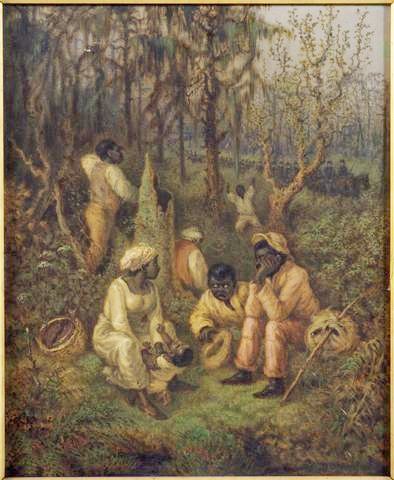05-07-2011, 07:06 PM

Fugitive Slaves in the Dismal Swamp, Virginia, 1888
|
David Edward Cronin Paints Image of Great Dismal Swamp at Slavery's End
|
|
05-07-2011, 07:06 PM
 Fugitive Slaves in the Dismal Swamp, Virginia, 1888
05-07-2011, 07:15 PM
A friend of mine grew up literally across the street from the Great Dismal Swamp.
05-08-2011, 04:06 AM
Swampy seems happy enough.
That maybe due to the southern exposure of her environment. A Virginia swamp in winter would test the soul of the most fervent believer.
05-08-2011, 12:01 PM
Errr one essential thought/comment, Slavery has not truly ended and continues to exist in multiple parts of the World. In and out of swamps...
Rudie
05-08-2011, 06:12 PM
haikuman wrote: Quite true, Rudy. I phrased my subject line to comport with the previous subject lines, not to make an excessive political claim. Slavery and human trafficking (especially in women/children for sexual and domestic slavery) is all too common today.
05-09-2011, 01:50 AM
There's in the swamp, and there's really in the swamp. Much of this area is considered to be part of the Dismal Swamp. The outer part isn't horrible. It really depends on where the slaves were encamped. If they were trying to hide, then they'd go deep into the swamp where it'd be very hard to find them. You certainly wouldn't see soldiers passing by.
In SE Va the winters aren't bad. Our coldest weather is in Jan/Feb with averages in the 30's. We can get a cold spell with high's in the low 20's, but it doesn't last long. Snow is not common. Other than a dusting.
05-09-2011, 12:34 PM
I've never been in that part of the state but I know what the swamps are like in the SE part of the state and if
they're anything like that it's bad, really bad. I guess that's about the only part of the state of NC I haven't been in. That's an awesome piece of art I will say that. For the life of me I don't understand what people were thinking when they started bringing slaves into this country. My wife and I have talked about it many times and just can't figure out what the heck they were thinking. Supposedly Christian people buying, selling and trading human beings like they were cattle. Makes me sick to my stomach when I think about it.
05-09-2011, 12:44 PM
Grateful11 wrote: http://www.digitalhistory.uh.edu/history...onomic.cfm Presents this thesis: Nevertheless, slavery was indispensable to European development of the New World. It is inconceivable that European colonists could have settled and developed North and South America and the Caribbean without slave labor. Moreover, slave labor did produce the major consumer goods that were the basis of world trade during the eighteenth and early nineteenth centuries: coffee, cotton, rum, sugar, and tobacco. And from academialand: http://eh.net/encyclopedia/article/wahl.slavery.us Consensus That Slavery Was Profitable It appears there is some pretty hot contention still, but the evidence that slavery was driven to a large extent by economic gain for the slave-holders is pretty strong. Christians could look to parts of the Old Testament where there are descriptions of God saying it's okay to have what is essentially slaves: http://en.wikipedia.org/wiki/The_Bible_and_slavery
05-09-2011, 06:54 PM
Yes. it has always blown me away, too. Yet it's not too surprising that people base unconcionable ideas on something they read/"interpreted" in some supposed "holy" book.
05-09-2011, 07:16 PM
This thread has become far more substantive than originally conceived. Go, us! :bubb:
|
|
« Next Oldest | Next Newest »
|